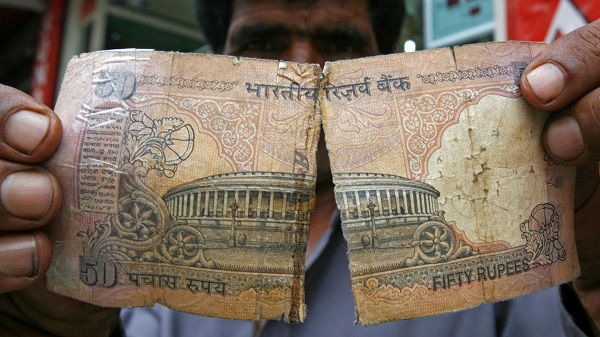RBI issued Master Circular regarding Facility for Exchange of Notes and Coins at bank branches dated July 02, 2018 in which the RBI mandate to the banks for exchanging the soiled notes and accepting the coins at bank counters.
RBI, in its circular, said that all branches of banks in all parts of the country are mandated to provide the following customer services, more actively and vigorously to the members of public so that there is no need for them to approach the RBI Regional Offices for this purpose:
(i) Issuing fresh / good quality notes and coins of all denominations on demand,
(ii) Exchanging soiled / mutilated / defective notes, and
(iii) Accepting coins and notes either for transactions or exchange.
It will be preferable to accept coins, particularly, in the denominations of ₹ 1 and 2, by weighment. However, accepting coins packed in polythene sachets of 100 each would perhaps be more convenient for the cashiers as well as the customers. Such polythene sachets may be kept at the counters and made available to the customers.
All branches should provide the above facilities to members of public without any discrimination on all working days. The scheme of providing exchange facility by a few select currency chest branches on one of the Sundays in a month will remain unchanged. The names and addresses of such bank branches should be available with the respective banks.
The availability of the above-mentioned facilities at the bank branches should be given wide publicity for information of the public at large.
None of the bank branches should refuse to accept small denomination notes and / or coins tendered at their counters.
Liberalized definition of a Soiled Note:
In order to facilitate quicker exchange facilities, the definition of soiled note has been expanded. A ‘soiled note’ means a note which has become dirty due to normal wear and tear and also includes a two piece note pasted together wherein both the pieces presented belong to the same note and form the entire note with no essential feature missing. These notes should be accepted over bank counters in payment of Government dues and for credit to accounts of the public maintained with banks. However, in no case, these notes should be issued to the public as re-issuable notes and shall be deposited in currency chests for onward transmission to RBI offices as soiled note remittances for further processing.
Charges for exchanging notes:
Where the number of notes presented by a person is up to 20 pieces with a maximum value of ₹ 5000 per day, banks should exchange them over the counter, free of charge. Where the number of notes presented by a person exceeds 20 pieces or ₹ 5000 in value per day, banks may accept them, against receipt, for value to be credited later. Banks may levy service charges as permitted in Master Circular on Customer Service in Banks.
Mutilated Notes – Presentation and Passing:
A mutilated note is a note of which a portion is missing or which is composed of more than two pieces. Mutilated notes may be presented at any of the bank branches. The notes so presented shall be accepted, exchanged and adjudicated in accordance with Reserve Bank of India (Note Refund) Rules, 2009.
Extremely brittle, burnt, charred, stuck up Notes:
Notes which have turned extremely brittle or are badly burnt, charred or inseparably stuck up together and, therefore, cannot withstand normal handling, shall not be accepted by the bank branches for exchange. Instead, the holders may be advised to tender these notes to the Issue Office concerned where they will be adjudicated under a Special Procedure.
Click here to read full text of circular.
For more updates:
1. Like our Facebook Page
2. Join our Telegram Group
3. Join our Facebook Group
4. Subscribe to our Youtube Channel
5. Follow us on Twitter
6. Follow us on Instagram

